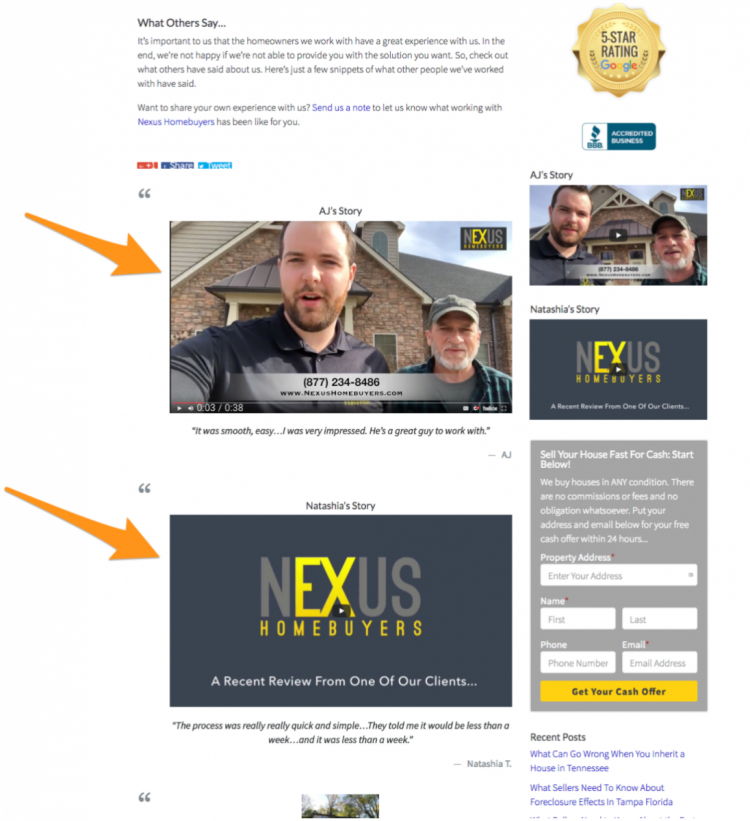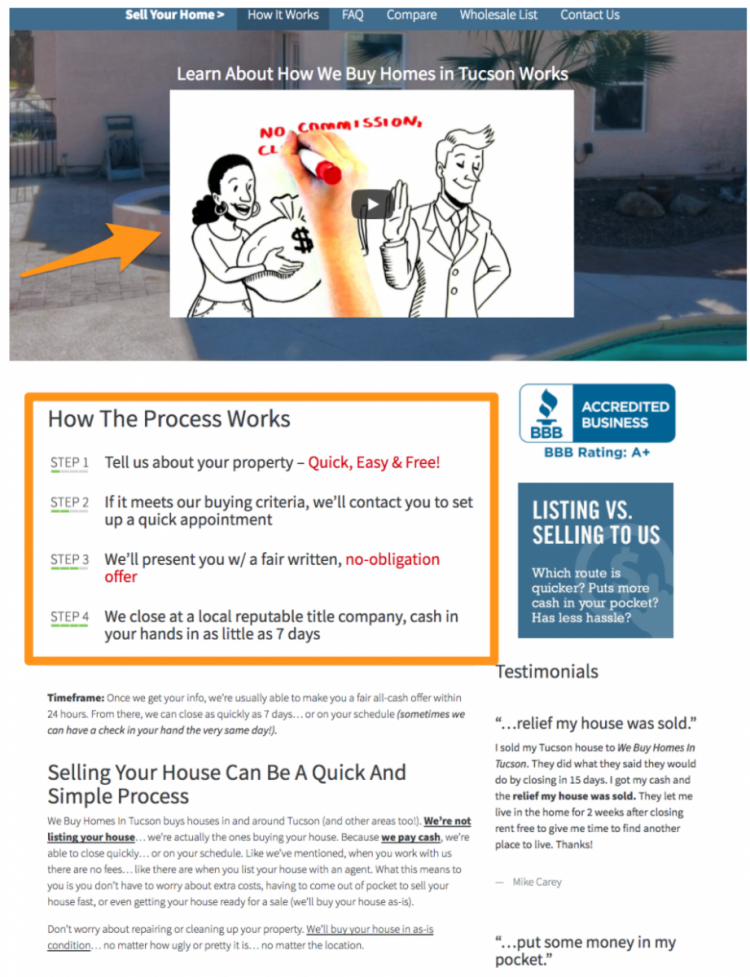 Every year, the real estate market changes. And sometimes, it changes faster than you thought it was going to. 20 years ago, agents and investors didn’t have real estate websites — they relied on the talk of the town and coffee-shop conversations to generate business.
Every year, the real estate market changes. And sometimes, it changes faster than you thought it was going to. 20 years ago, agents and investors didn’t have real estate websites — they relied on the talk of the town and coffee-shop conversations to generate business.
Of course, that is still partly true today, but with a twist: If you’re not online … then you’re behind the curve and you’re likely losing a steady amount of potential business.
Not because you suck at your job, but because people can’t find you where they’re looking: online.
That, though, is just one example of how the real estate industry is changing. That doesn’t mention constantly fluctuating inventory and interest rates or technological advancements (like drones and 3D house walkthroughs).
Clearly, you have a lot to keep track of.
To help, though, here are five real estate market predictions that we here at Carrot and some of the top real estate investors working with us are expecting to see.
1. Inventory Will Increase Slightly
Over the past few years, the U.S. has consistently broken the record for lowest inventory.
For instance, Forbes reports that, in 2010, inventory sat just under one million, at 967,604. The most recent count puts that number at 653,347.
As you already know, that low inventory means you need to be careful with your investments. It drives the cost of homes upward with bidding wars and the number of opportunities downward.
Fortunately, there’s good news on the horizon.
 Samantha Sharf, Forbes columnist, continues…
Samantha Sharf, Forbes columnist, continues…
“The general consensus is that inventory will pick up slightly. The biggest reason for this modest optimism is that the current situation is unsustainable. Prices cannot rise faster than wages forever. Plus, life events will eventually force reluctant sellers off the sidelines.”
 And she’s not alone in her prediction. Danielle Hale, the chief economist for Realtor.com, says,
And she’s not alone in her prediction. Danielle Hale, the chief economist for Realtor.com, says,
“The majority of the year should be challenging for most buyers, but we do expect growth in inventory starting in the fall… We expect the relief to start in the upper tiers, and it will make its way down to the lower tiers.”
The beginning of the year likely won’t see much change, but, by the end of the year, here’s to hoping that inventory starts on an upward slope — even if it’s slight.
2. Renting Will Become A More Popular Option
With the cost of housing surging in certain areas, we’ll likely see an increase in the portion of people who choose to rent instead of buy.
CNBC reports that,
“In the nation’s top 50 markets, half of the housing stock is now considered overvalued, based on market fundamentals, like income and employment.”
When the price of housing moves upward, more people, generally speaking, look to renting options rather than buying options.
This, of course, depends on your location and requires that you understand the place where you invest. Overall, though, expect renters to flood the market.
 Jason Bible, real estate investor in Houston, says that he’s going to try and get his hands on as many rentals as he can this year.
Jason Bible, real estate investor in Houston, says that he’s going to try and get his hands on as many rentals as he can this year.
“We buy over 100 houses a year and this year I will buy as many rentals as I can get my hands on. In fact, I am going to buy some of them at 100% retail with a 20% down loan.”
You might want to consider doing the same.
3. Home Buyers Will Be Even More Tech Savvy
The real estate market moves fast.
But the tech world — driven in large part by social media, a mobile-first culture, and ecommerce trends shaping the future — moves even faster.
In fact, technological advancements are a big part of what makes keeping up with real estate trends difficult.
Don’t expect those innovations to slow down.
Alex, one of the marketing leads here at Carrot, recently bought a home and he signed practically every document on DocuSign rather than in-person.
Additionally, millennials — one of the first tech-savvy generations — are buying more and more houses each year. By 2025, they are expected to form twenty million new households.
Still, though, about two-thirds of millennials haven’t reached the average home buying age of 32.

So we can expect the millennial home-buying trend to continue through the next few years.
And as you might have guessed, millennials aren’t just comfortable with technology; they prefer it.
This means that we’re going to the rapid adoption of apps and online tool like virtual tours, digital contract signing, and even decentralized house visits.
4. Interest Rates Will Increase By About .25% or .5%
The more that interest rates increase, the fewer people we’ll see buying homes — which would further incentive people to rent instead.
Unfortunately, interest rates are still going to rise this year. However, they probably won’t rise too significantly.
 That’s not because they aren’t primed to, however. But, as real estate broker, Richard Haynes, predicts,
That’s not because they aren’t primed to, however. But, as real estate broker, Richard Haynes, predicts,
“Mortgage rates will rise by 0.25%, and possibly by 0.50% if things get crazy… If rates go higher than that, the Fed will step in and reinvest more principle and buy up mortgages to lower rates and get them under control.”
More than likely, an interest rate increase of .25% or .5% won’t make a remarkable impact on the number of buyers. Of course, that percentage has the potential to cruise higher.
Daniil Kleyman, a real estate developer from Richmond, VA, and owner of RehabValuator, says, “Rates are going up for sure, and probably significantly.”
No one can know exactly what’s going to happen. But rates are going to rise and the federal government will probably step in to balance those rates out once they climb too high.
5. Investors And Agents Will See Greater Competition
Overall, agents and investors have seen remarkable success during the last few years.
The economy has continued on an upward slope and unemployment has steadily decreased, which has encouraged people to spend more on housing.
In the south especially, sales are booming and expected to grow 6% rather than 2.5% — the national average.
Because of that lucrativeness, though, agents and investors will probably see a massive burst of new entrepreneurs entering the space and trying to claim their slice of the pie.
 Dan Walters from Treasure Valley Home Solutions, says,
Dan Walters from Treasure Valley Home Solutions, says,
“This will be the year that we see many enter the market for the first time as an investor following the wave of hype of the nationwide real estate cycle.”
That cluttered trend means that you’ll see more competition.
Fortunately, that competition probably won’t be nearly as experienced as you are — that is if you’ve been an investor or agent for quite some time.
Which further means you shouldn’t have much trouble competing.
Still, according to our own data that we pulled from our thousands of Carrot customer spread across the U.S., lead generation is up — meaning the market is hot — but conversion rates are slightly down.
Take sellers, for instance. In past years, the number of online sessions to their websites increased by a whopping 85%. Similarly, they generated 65% more leads.
Their average conversion rate, however, went down by about 10%.
Why?
Well, even though there are lots of opportunities in the real estate industry, there are an increasing amount of people who want a piece of that opportunity.
Which means your prospects have more options than they did last year. And with more people flooding in to claim their slice of the revenue, conversion rates are softening a bit.
It’s also worth mentioning that agents will experience competition from another source. Namely, from technological advancements that threaten to either change or outright destroy their profession.
Online tools like Zillow, Matterport, and Dotloop are working toward doing what Uber did to taxis or Airbnb did to hotels.
They are moving the service of agents online, which has two noteworthy benefits for the consumer.
- It streamlines the process.
- It costs less money.
 Edward Beck from Quick Sell Buyers goes so far as to say,
Edward Beck from Quick Sell Buyers goes so far as to say,
“Unfortunately, [agents] are on a downtrend. Zillow is finally gonna start taking a small market. But this is again the beginning of the end of Agents. They still have five to seven more good years. Also, flat fee companies are gonna eat a lot of market share.”
It’s unlikely that real estate agents will completely disappear over the next decade, but it’s equally ignorant to assume that nothing will happen to the profession.
Over the coming years, agents might fall into a more advisory role for high-end homes. Or they might become the much-needed experts for first-time homebuyers.
Whatever the case, agents face competition from technology and investors face competition from ambitious entrepreneurs.
What All Of This Means For Agents And Investors
Okay. Now you know what to expect. But what does all of that mean for your real estate business?
How should you be prepared to adapt this year and in the years to come?
Well, the good news is that the majority of real estate leaders expect this year and next to be phenomenal. So, despite any discouragement, you might feel toward upcoming trends, the overall picture is promising — for agents and investors alike.
What is important to recognize, however, is that, as the real estate market becomes increasingly crowded, you need to stand out from that clutter.
If your website doesn’t convert or build credibility like it should, or if it doesn’t load fast enough to rank in Google, or demand attention, then you’ll have little chance of success in 2020 and beyond.
At Carrot, we help beginner and top-level investors and agents drive traffic, pull leads, and land deals.
We encourage our customers to use video testimonials like this one from Nexus Homebuyers…
And as you can see, below, Nexus Homebuyers doesn’t stop with one.

We also encourage our customers to dive right into what they do and why they’re awesome on the homepage of their website.

Remember, this is the first thing that people see when visiting your page. Use it to build credibility and trust as fast as you can.
More than likely, the person landing on your website has a few other tabs open as well — browsing through their options.
You need to stand out as the best and most friendly.
For investors and agents, alike, having a “How it works” page can help to eliminate your prospect’s fears and make them more comfortable with giving you a call.
You can do something similar to what We Buy Homes in Tucson does.

If you want to learn more about how Carrot can help you stand apart from the rest of the crowd, you can go here and read all about it (we’d love to work with you :-) ).
Additionally, consider this advice that real estate investor, Tom Cafarella — the number-one home buyer in Boston who buys and flips over 100 homes each year — offers for the upcoming year.
“This means that we need to: (1) make sure we have enough cash on the sideline to capitalize on the market when it does change, (2) do less — or no — long-term projects so that we don’t get caught in the market shift, and (3) wholesale more and close on less, so that we are taking on less risk.”
For the changing market, that’s advice worth taking to heart.
Also, a side-note worth discussing is the current lucrativeness of the real estate coaching industry.
Dan Barrett from Adwords Nerds, says
“The REI coaching business is booming.”
Since so many new agents and investors are entering the real estate scene, those newbies need people to teach them.
If you’re an experienced investor or agent, then you might want to consider leveraging this trend and starting your own online course. This could generate another source of income to supplement your real estate work while not taking a ton of extra time.
Said another way, if you want to get into the real estate coaching world, now’s a perfect time.
Every investor and agent will adapt to the changing real estate environment differently. How you do it is, naturally, your own choice.
Above all else, though,
- Build immediate credibility on your website.
- Adapt to unexpected shifts in the market.
- Avoid long-term projects.
- Leverage technology rather than avoiding it.
Real Estate Market Predictions for 2020 and Beyond
Each year brings new developments to the real estate world.
Some of those, you anticipate. Others, you don’t.
But one thing’s for sure. The real estate world will change. And if you’re not ready to adapt to it, then your business will suffer.
If, on the other hand, you build credibility on your website to stand above the cluttered market, consider leveraging rental properties, and utilize technology that can increase your business’ success (like drones and 3D tours), 2020 will be a great year.
Best of luck this year and, please, let us know how it goes and if there’s anything we can do to help you.
And what do you think? Are there any trends we missed? Or do you think any of our predictions are wrong?
Let us know your opinion in the comment section of this article.
